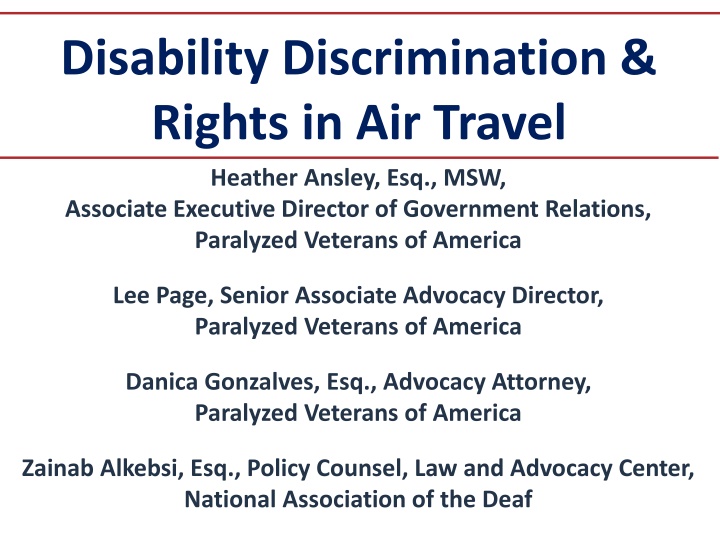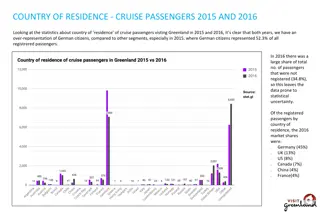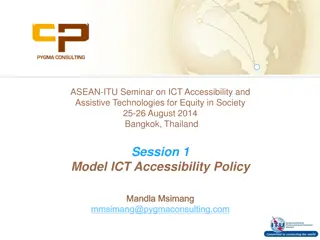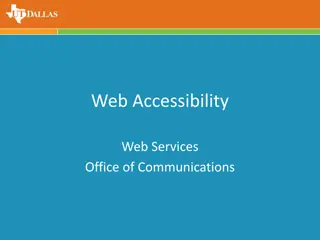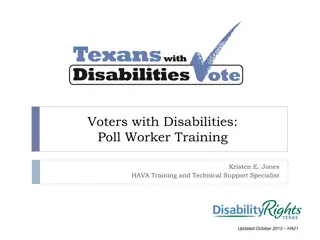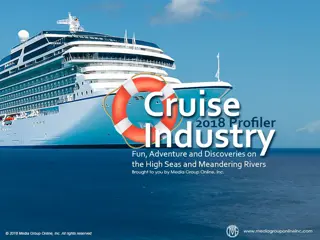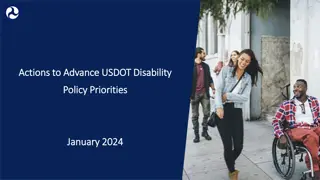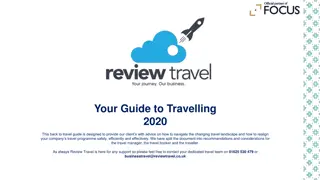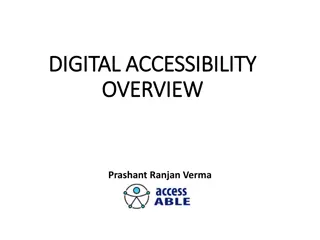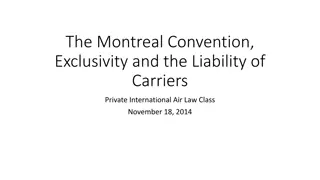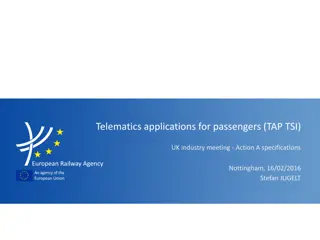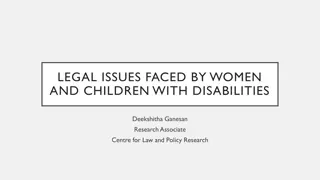Ensuring Rights and Accessibility in Air Travel for Passengers with Disabilities
Air travel is governed by laws like the Air Carrier Access Act and DOT Passenger Bill of Rights to prevent disability discrimination. Passengers have rights to dignified treatment, accessible information, assistance with disabilities, and resolving issues. Complaints can be filed for violations, including lack of effective communication for Deaf/hard of hearing passengers.
Download Presentation

Please find below an Image/Link to download the presentation.
The content on the website is provided AS IS for your information and personal use only. It may not be sold, licensed, or shared on other websites without obtaining consent from the author.If you encounter any issues during the download, it is possible that the publisher has removed the file from their server.
You are allowed to download the files provided on this website for personal or commercial use, subject to the condition that they are used lawfully. All files are the property of their respective owners.
The content on the website is provided AS IS for your information and personal use only. It may not be sold, licensed, or shared on other websites without obtaining consent from the author.
E N D
Presentation Transcript
Disability Discrimination & Rights in Air Travel Heather Ansley, Esq., MSW, Associate Executive Director of Government Relations, Paralyzed Veterans of America Lee Page, Senior Associate Advocacy Director, Paralyzed Veterans of America Danica Gonzalves, Esq., Advocacy Attorney, Paralyzed Veterans of America Zainab Alkebsi, Esq., Policy Counsel, Law and Advocacy Center, National Association of the Deaf
Air Carrier Access Act (1986) Prohibits discrimination on the basis of disability in air travel Air carriers may not: Refuse transportation Require advance notice of travel Require passenger to fly with companion (few exceptions) Charge for accommodations Require passenger to accept special services not requested Air carriers must: Provide assistance with boarding, deplaning, & connections Train personnel who deal with traveling public to proficiency Have a specially trained Complaint Resolution Officer Have an accessible lavatory on twin-aisle aircraft
DOT Passenger Bill of Rights (2022) Right to: Be treated with dignity and respect Receive information about services, in an accessible format Assistance on aircraft and at airports Travel with an assistive device and service animal Receive seating accommodations Accessible aircraft features (when required) Resolution of a disability-related issue
Filing Air Travel Complaints Legal actions ACAA complaints no private right of action State law claims for carrier s actions Informal complaints File directly with carrier and/or DOT (via mail or online) For DOT complaints, carrier must respond within 30 days Complaints are not public, but counted in quarterly statistics Formal complaints Public on www.regulations.gov Carrier has opportunity to respond DOT investigation, possible fines, and enforcement actions PVA v. American Airlines
Air Carriers & Effective Communication The ACAA currently only mandates that safety videos be captioned There is a lack of closed captioning for in-flight entertainment (IFE) and public announcements (PAs) Although carriers have provided IFE for decades, it remains inaccessible for Deaf/hard of hearing passengers who are entitled to the same enjoyment as hearing passenger Despite being a modern form of travel, carriers are essentially the last frontier of uncaptioned videos
Air Carriers & Effective Communication In this age of smartphones, tablets, and laptops, captioning is now technically and economically feasible on all forms of displays Captioning is now available on nearly every form of Internet video streaming services and nearly every movie in theaters Reality is that the vast majority, if not all, of the videos shown on IFE are already captioned elsewhere
Air Carriers & Effective Communication Frustration in opening airline IFE, only to find very little or none are captioned There s no access to aural-only PAs, which can be dangerous in an air emergency Passengers pay the same ticket price as hearing passengers, yet do not receive equitable services
Air Carriers & Effective Communication 2016 DOT negotiated rulemaking: New IFE systems must support closed captions and audio descriptions If aircraft has inaccessible seatback IFE, must provide an alternative personal entertainment device (PED) with accessible comparable video content Carriers must request and obtain 100% closed-captioned and audio-described of covered IFE from video content providers Airline Information and Entertainment Access Act Introduced in 2021 in 117th Congress Will be re-introduced in 118th in FAA Reauthorization
Boarding, Deplaning, & Transfers ACAA requirement for assistance with boarding, deplaning, and connections Wheelchair users currently transfer to/from seats use of aisle chairs & experience untrained personnel Current aircrafts lack accessible path of travel
Stowage of Wheelchairs and Scooters ACAA requirements for wheelchair and scooter stowage Wheelchair and scooter users must surrender any device that cannot be placed in the cabin for stowage in the cargo hold Between 2019-2021, nearly 21,000 wheelchairs and scooters were lost, delayed, or damaged
Study on In-Cabin Wheelchair Restraints In September 2021, the Transportation Research Board released a study on the feasibility of flying in a wheelchair. No issues were identified that seem likely to present design and engineering challenges so formidable that they call into question the technical feasibility of an in-cabin wheelchair securement system and the value of exploring the concept further. The report identified areas for further study.
History of Private Right of Action Prior to Alexander v. Sandoval, 532 U.S. 275 (2001), the 5th, 8th, and 9th Circuit Courts recognized a private right of action under the ACAA. Since then, the 2nd, 5th, 9th, 10th, 11th, and D.C. Circuit Courts have ruled there is no private right of action. The 1st, 3rd, 4th, and 6th Circuit Courts have not determined whether there is a private right of action post-Sandoval, but district courts under their jurisdiction have held that there is not. No action in the 7th Circuit. In February 2020, the American Bar Association issued a resolution urging Congress to amend the ACAA to establish a private right of action and provide equitable and legal relief.
Air Carrier Access Amendments Act S. 545/ H.R. 1267 Requires DOT to assess civil penalties for ACAA violations & refer patterns of discrimination to DOJ Establishes a private right of action Requires DOT to formulate standards to address effective boarding/deplaning, IFEs and PAs, lavatories, seating accommodations, and stowage for assistive devices Carriers must comply 5 years after finalized standards Ensures all covered gates, counters, ticketing areas, and customer services desks are accessible
2023 FAA Reauthorization The current FAA authorization expires on September 30, 2023. Congress will either extend the current authorization or pass a new authorization. The reauthorization is typically seen as a key vehicle for moving air travel legislation. ACAAA Emergency Vacating of Aircraft Cabin (EVAC) Act Prioritizing Accountability and Accessibility for Aviation Consumers Act Other disability-focused legislation The House Transportation and Infrastructure Chairman has called for a draft of the reauthorization by July.
Pending Regulatory Action Final rule on accessible lavatories on single-aisle aircraft Notice of proposed rulemaking on ensuring safe accommodations for wheelchair users Future action on in-cabin wheelchair restraint systems
